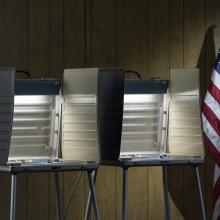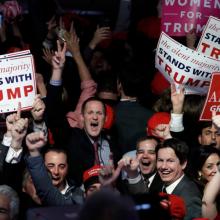Robert P. Jones

A woman wears a jacket with a QAnon logo while hundreds of vehicles including 18-wheeler trucks, RVs, and other cars are parked as part of a rally at Hagerstown Speedway after some of them arrived as part of a convoy that traveled across the country headed to Washington, D.C., to protest coronavirus disease (COVID-19) related mandates and other issues in Hagerstown, Md., March 5, 2022. REUTERS/Stephanie Keith
About one in five Americans mostly agree with ideas consistent with the QAnon conspiracy theory, according to a new survey from the Public Religion Research Institute. That’s an increase from one in seven since last year.
According to new survey data released by the Public Religion Research Institute (PRRI), 57 percent of Americans ranked fairness of presidential elections as the top critical issue in the country when asked to choose from 14 issues ranging from the COVID-19 pandemic to racial inequality.
Every nonfiction book is personal, often arising from some faint but persistent insight, a kernel of awareness that blossoms into a story that demands to be told. White Too Long began with a growing consciousness of the abiding presence of white supremacy within the faith we white Christians have inherited and live within.
Last week, President Donald Trump announced via Twitter his intent to bar transgender from people serving in the military — a move reportedly heavily influenced by the Family Research Council, a conservative evangelical lobbying organization. The Public Religion Research Institute reports that more than one in five Americans have a close friend or family member who is transgender and more than six in ten Americans say transgender people face a lot of discrimination in the country today. This snapshot captures the dynamics of the Trump era: the anxieties and reactionary measures of religious conservatives within a cultural and religious landscape that is dramatically shifting.
Americans voted largely along the lines of race, education, and party identification. Nonwhites strongly preferred Clinton, while whites decisively chose Trump. Compared with past Republicans, the businessman received a stunning surge of votes from non-college-educated white voters.
None of this is surprising.
And yet the result upends so much conventional wisdom.
They are many, shift between parties, and typically side with the candidate who ends up winning the White House.
That’s what makes Catholics the ultimate swing voters in the U.S. And this year they are going to throw their weight behind Democrat Hillary Clinton, a panel of political analysts said on Oct. 31.
Much ink has been spilled this election cycle on the future of evangelicalism given the “God gulf” between some white evangelical Donald Trump supporters and those evangelicals who have either long denounced Trump’s candidacy or who more recently have decided that some of Trump’s rhetoric and policy proposals have gone too far. But the root of this divide may be found in this fact, released this week by the Public Religion Research Institute: “No group has a dimmer view of American cultural change than white evangelical Protestants.”

Image via Burlingham/Shutterstock.com
A quarter of U.S. adults do not affiliate with any religion, a new study shows — an all-time high in a nation where large swaths of Americans are losing faith.
But while these so-called “nones” outnumber any religious denomination, they are not voting as a bloc, and may have little collective influence on the upcoming presidential election.
The rapid growth of the religiously unaffiliated, charted in a survey released by the Public Religion Research Institute on Sept. 22, is raising eyebrows even among those who follow trends in American religiosity.
Most Americans say the waves of children crossing into the United States from Central America are refugees fleeing danger at home. And they say the United States should support these children while reviewing their cases, not deport them immediately.
Democrats (80 percent), independents (69 percent), and Republicans (57 percent) favor offering support to unaccompanied children while a process to review their cases gets underway.
Most major religious groups say the same, including white evangelical Protestants (56 percent), white mainline Protestants (67 percent), minority Protestants (74 percent), Catholics (75 percent), and the religiously unaffiliated (75 percent).
(The survey sample of 1,026 adults was not large enough to capture the views of smaller religious groups, such as Jews, Muslims, or Mormons).
“It makes a difference that we are talking about children facing violence and harm,” said Robert P. Jones, CEO of PRRI. “The value of keeping families together cuts across all party lines.”
Yesterday was one of the craziest days in recent American political history. House Majority leader Eric Cantor fell to Tea Party economics professor David Brat in a primary upset no pundit saw coming.
While the early analysis suggested that support for immigration reform may have been what brought Cantor down, exit polling suggests his lack of attention to the concerns of his constituents and his inability to deliver on his promises were a greater factor than the immigration issue. Cantor never brought a vote on immigration to the floor and was never a strong ally on immigration.
Earlier on Tuesday, the Public Religion Research Institute (PRRI) released an immigration poll at the Brookings Institute. Nearly 80 percent of all Americans and nearly two-thirds of white evangelical Protestants remain in support of immigration reform that includes a path towards citizenship or legal status.
In recent surveys, the religious “nones” — as in, “none of the above” — appear to lead in the faith marketplace. In fact, “none” could soon be the dominant label U.S. adults pick when asked to describe their religious identity.
And, researchers say, this is already making nones’ attitudes and opinions less predictably liberal on social issues.








